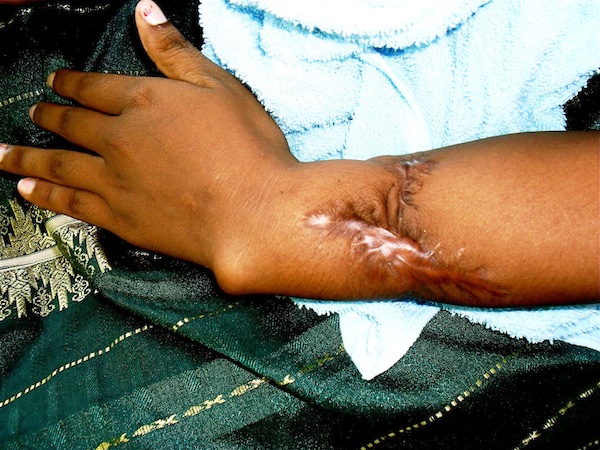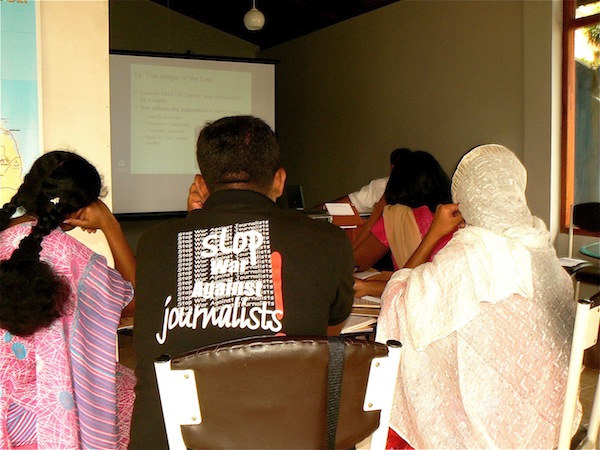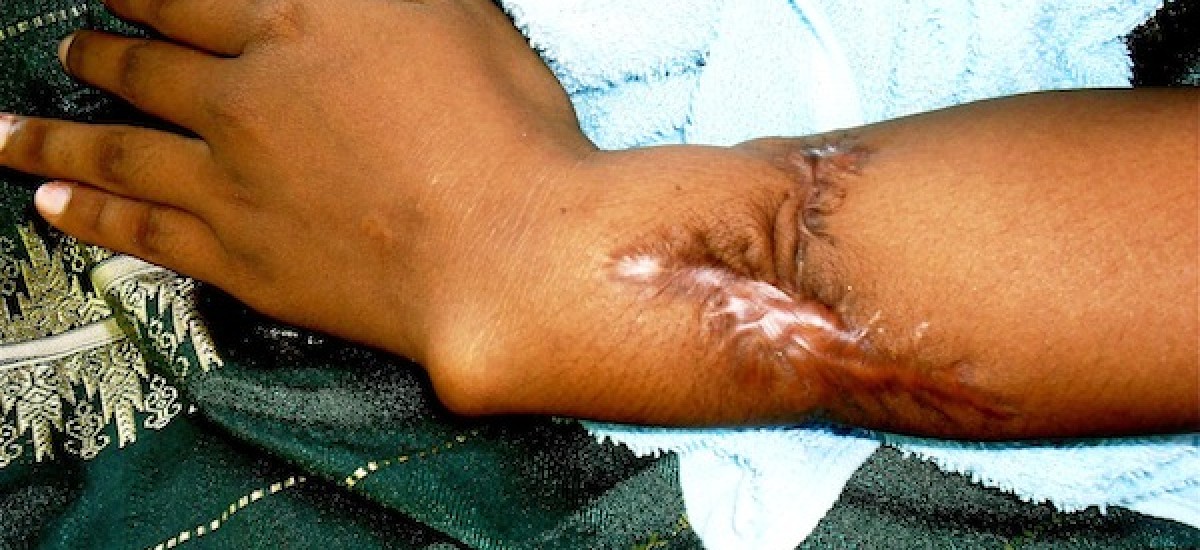
Photo by author
The end of hostilities in May 2009 saw some 270,000 to 300,000 Tamils fleeing the conflict zone in the North and settling in camps for internally displaced people. Fleeing the fighting, together with the civilians, were thousands of Tamil Tiger combatants – many of them injured women fighters – both young women and more experienced middle-aged female fighters.
M10 – who lost her left leg in a 1995 battle in the Wanni region – surrendered herself at the Omantai military checkpoint in the closing days of the war after fleeing the heavy shelling on Puthikkudiyiruppu with civilians. There she was immediately taken to Pampaimadu Camp for interrogation by Sri Lankan army intelligence and the Criminal Investigation Department (CID) of the police force. A year later, in late April 2010, M10 was released.
M7, like M10, is an injured ex-Tamil Tiger young woman combatant who surrendered at the Omantai checkpoint in the closing days of the war. In April 2010 she was released after a year in Cheddikulam camp, where the CID interrogated her. M7 recalls how she tried to look for a job in Batticaloa after the army left her in her mother’s house:
My father passed away when I was in the jungle. Now my mother has to look after my six younger sisters. I did not want to be an extra burden to my mother because of my disability, and so I traveled to Batticaloa town with my three disabled [ex-LTTE] friends. We registered ourselves at the IOM [International Organization for Migration] office and asked whether there were any jobs for disabled young women, like us. After taking our details the IOM officer told us that they would contact us if anything turned up, and then asked us not to come back to the office to make enquiries. We were hurt.
The IOM programme in Batticaloa and other parts of the East, funded by the United States government, says it “provides information and counseling to former fighters, referring them to vocational training, psychosocial support and employment opportunities” (Embassy of the United States 2009). Some participants, with appropriate experience and skill sets, also receive small grants to help them start their own business in their local communities. Mehreteab (2007) offers a word of caution for dealing with disabled ex-combatants when he points out that many have little education, few skills and poor health in societies where it is already difficult to start a small enterprise or find employment to generate adequate income to achieve a moderate standard of living.
Disabled ex-combatants, more so female ex-combatants, are one of the most difficult to reintegrate in the absence of specific medical and psychosocial care in communities. Due to their disability they are unable to generate any income without intensive training and rehabilitation (Mehreteab 2007). The International Labour Organization (ILO) in its guidelines on disabled ex-combatants warns against treating them as “objects of charity” and adds that these ex-combatants “do not want to depend on families and communities to sustain them…[and] wish to become economically and socially active in their civilian communities and avoid being a burden on society”
Nonetheless, in the face of deprivation and hardship, female household heads like ex-Tamil Tiger young woman fighter M11 in Mylampavely feel empowered and proud of their achievements:
My husband works for the local government, but it’s actually me who runs the household. I am proud that I can care for my three children and also help women in the neighbourhood, especially those young girls who have returned home from the jungle with just the clothes on their back. Life’s tough, it’s hard. But I have survived and moved on. My story with the Tamil Tigers would probably fill a book – and there are good and bad memories. The women in the community respect me – they have to. I sacrificed my life in the movement [LTTE] for these people.
In post-war Batticaloa, M11 has a respected position in the district’s matrilineal society where women hold most of the responsibilities and authority in the family. She is referred to as perria akka (big sister in Tamil) in female networks in the clearly defined matriclans and matrilocal households in Mavadivembu, a status she attained after she married soon after her demobilization following the 2002 ceasefire. With a living husband and three children, she has a sumankali or properly wedded woman status. The sacred knot or thali tied by their husbands during the marriage and the red dot or kukum symbolizes the sumankali. Lawrence (2007) explains that Tamil culture respects the sumankali and it is common understanding that she has the capacity to provide protection through female networks.
M11 spends her free time, after sending her children to school, seeking out the former LTTE child combatants from Mavadivembu who self-demobilized in 2004 when the Batticaloa-based commander of the Tamil Tiger forces in the East, V. Muralitharan or Col. Karuna, split off from the main LTTE.
In 2002, a bitter political rivalry began to emerge between the LTTE supreme leader Prabhakaran, who had his loyal Northern (Wanni) command, and the Eastern commander of the Tamil Tigers Col. Karuna. In April 2004, the Wanni faction of the LTTE fiercely attacked Karuna’s 6,000 troops in the East and, sensing defeat, the Eastern Tamil Tiger commander disbanded his forces and went into hiding (Human Rights Watch 2004; Goodhand, et al., 2009). Thousands of child soldiers who were forcibly recruited were forced to leave Karuna’s group and countless girls self-demobilized silently by disappearing into war-affected communities where, today, they still struggle to cope. These self-demobilized former child soldiers are now young adults.
Former child soldier M12, who was recruited by the LTTE when she was 13, relates the visits made by M11:
I really look forward to the visits by perria aka [big sister]. I am very eager to tell my stories to people, but nobody wants to listen to me. We need people to talk to. Sometimes it is good to talk to people to get our problems out. Sometimes we feel we have been forgotten; dumped into the community and then abandoned. Perria aka was one of us in the jungle. She understands what we went through.
The protection roles played by mature women ex-combatants in the community reintegration of former young women fighters warrants further research as these girls struggle to develop a new sense of identity, unlinked to war.
In Batticaloa, women heading households bear the main burden of caring for injured Tamil Tiger female ex-combatants and traumatized returned former girl child soldiers in the absence of social welfare services. Though families in east Sri Lanka have been displaced, dispossessed and dispirited in the long running civil war and the December 2004 tsunami, matrilocal traditions and support provided by matrilocal household clusters seemed to have survived (McGilvray & Lawrence 2010). As this researcher found in his field trips, in a matrilineal society all the families which are part of the same sub-clan system could be found living in the same vicinity. McGilvray & Lawrence (2010) document that matrilocal clusters of married sisters in adjacent households in the same compound are emotionally appealing as it allows for shared childcare and sisterly solidarity that also acts as a deterrence against domestic violence.
Ruwanpura & Humphries (2004) found in the kinship networks in East Sri Lanka that neighbours and friends are an important source of assistance for female-headed households – particularly non-financial help that many women found invaluable such as childcare, help in chaperoning children to school, help with cooking, and emotional support. Both researchers caution against dismissing the value of this friendship as it makes female heads feel more emotionally stable and secure.
The economic case for helping female-headed households, especially with extra mouths to feed in the care given to returning female ex-combatants, is strong. Help cannot be limited to just food subsidies given out by the World Food Program in Batticaloa. The circumstances of the households in a post-conflict environment need to be taken into account.
As the former young Tamil Tiger women combatants aim to establish themselves as adult individuals in Sri Lanka by an identity transformation from militants to civilians, they also struggle for some measure of security in their lives. This researcher found that the predictability of organized schooling through local NGOs like the Jeeva Jothy Foundation, in Batticaloa, can help former girl child soldiers overcome their traumatic experiences and develop an identity separate from that of a combatant.
The former girl child soldiers are enrolled in schools near Jeeva Jothy, with the house wardens ensuring their safety to and from school. Former child soldier M15, who was 16 when she was brought to Jeeva Jothy by her mother in 2004, recalls her past and talks about the future:
After I came out of the jungle, I went back to my village school. There I was treated badly. My hair was short; the teachers always scolded me and the other kids did not want to mix with me. I was depressed. Some NGO people told my mother about Jeeva Jothy and she then brought me here. When I arrived at Jeeva Jothy, I was enrolled in Grade 9.
In Jeeva Jothy, I got to know other girls like me and began to feel more confident. I started mixing around. I passed my A-levels and now I am in the Open University’ Social Sciences Faculty. I want to finish university, get a good job and help look after my mother and sisters.
The consequences of girls not receiving an education may be more severe than boys and Ruwanpura (2006) points out that this is due to the array of ideological structures stacked against girls in a capitalist system with inherent patriarchal values. In female-headed households in Batticaloa, adult children staying at home seem to be a vital resource because the survival of the family often depends on their wages. Problems of poverty in these families are compounded by the presence of dependent children, like returned girl child soldiers, while advancement to more comfortable circumstances often depends on the ability of educated working-age children earning decent adult wages.

Photo by author
The economic case for assisting households headed by women in Batticaloa is strong. But lumping together all female-headed households in the East, and suggesting a single solution is a recipe for disaster. There is a need for a more nuanced analysis, one that recognizes that female-heads of households make difficult choices in conflict situations and their aftermath (Ruwanpura 2006, McGilvary & Lawrence 2010).
But the current situation in Sri Lanka, with the end of the war, offers a window of opportunity. With a combined effort and international cooperation, much progress can be made in mending the relationship between the Tamils in Batticaloa and the government. In order to start the healing process at both the individual and community level, first and foremost, dignity must be given to the young women ex-Tamil Tiger fighters. Also the female networks, in a matrilineal society, that heal, nurture and protect all groups of women ex-combatants must be recognized, valued and supported.
References
- Briggs, J. 2005, Innocents lost: When child soldiers go to war, Basic Books, New York.
- Embassy of the United States. 2009, Press release: U.S. Government helps former fighters gain a new start in the East, Embassy of the United States, Colombo, Sri Lanka.
- Goodhand, J., Klem, B. & Korf, B. 2009, “Religion, conflict and boundary politics in Sri Lanka”, European Journal of Development Research, vol. 21, no. 5, pp. 679-698.
- Human Rights Watch 2004, Living in fear: Child Soldiers and the Tamil Tigers in Sri Lanka, Human Rights Watch, New York.
- International Labour Organization. 1997, Manual on training and employment options for ex-combatants , International Labour Organization, Geneva.
- Lawrence, P. 2007, “The watch of Tamil women” in Women and the contested state: Religion, violence and agency in South and Southeast Asia, eds. M. Skidmore & P. Lawrence, pp. 89-116
- McGilvray, D.B. 2008, Crucible of conflict, Duke University Press, Durham, North Carolina.
- McGilvary, D.B. & Lawrence, P. 2010, “Dreaming of dowry: Post-tsunami housing strategies in eastern Sri Lanka” in Tsunami recovery in Sri Lanka: Ethnic and regional dimensions, ed. D.B. McGilvray & M.R. Gamburd, Routledge, London, pp 106 – 124.
- Mehreteab, A. 2007, Assistance to war wounded combatants and individuals associated with fighting forces in disarmament, demobilisation and reintegration programmes, Centre for Humanitarian Dialogue, Cornell University.
- Ruwanpura, K. 2006, Matrilineal communities, patriarchal realities: A feminist nirvana, University of Michigan Press, Ann Arbour.
- Ruwanpura, K. & Humphries, J. 2004, “Mundane heroines: Conflict, ethnicity, gender, and female headship in eastern Sri Lanka”, Feminist Economics, vol. 10, no. 2, pp. 173-205

